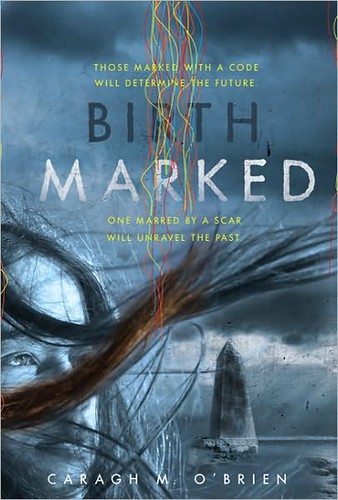
In the future, in a world baked dry by the harsh sun, there are those who live inside the wall and those, like sixteen-year-old midwife, Gaia Stone, who live outside. Gaia has always believed it is her duty, with her mother, to hand over a small quota of babies to the Enclave. But when Gaia’s mother and father are arrested by the very people they so dutifully serve, Gaia is forced to question everything she has been taught to believe. Gaia’s choice is now simple: enter the world of the Enclave to rescue her parents, or die trying.
In my opinion, writing a good dystopian novel can be tricky. First you’re building a world on something that already exists - our world. Next, you have to take a part of our world, skew it, then write about it, but in a way that makes the reader think that this could happen, especially given the current state of the world. This is usually what I look for in my dystopian novels and I found it in Birthmarked by Caragh O’Brien.
Birthmarked opens up with a birthing scene - a very gutsy move. Gaia, a young midwife, delivers her first baby; significant because it’s the first time she’s doing it on her own and because it lays the path for the reader to learn about the Enclave, the baby quota and the world that will be explored in Birthmarked.
After delivering the baby to the Enclave, Gaia heads home to find her parents have been taken to the Enclave for questioning. The mystery builds as Gaia questions why her parents were taken, what record the guards were interrogating her about and why her mother hid a ribbon with strange symbols on them.
Caragh does a great job at describing Gaia’s world and situation. Gaia’s home and all the places she travels to are carefully described, giving the reader a three dimensional view of the world. Once Gaia makes it into the walls of the Enclave the action is almost non-stop, like a wild ride with just enough pause for you to catch your breath and the right amount of twists and turns to keep you intrigued.
There is a splattering of biology in the narrative, but it is so well-weaved into the plot that it does not read like a science book. For the shipping enthusiasts there is a bit of romance which, while not necessary to the plot advancement, does a good job at adding layer of charm.
What I liked best about this book was the questions that it raised. It’s a great book to open discussions on prejudices in society, hierarchy and class. It also opens questions about the way we use our limited resources and what might happen if we aren’t careful to care for the world we have. While these are great questions, I appreciated the way that they were subtly intertwined in the narrative. There was no blaring agenda, the questions rose organically from the story and I appreciated this greatly.
Hi! I like your prerequisites for what makes a good dystopian, especially the part where one can easily imagine our current world heading towards the bleak future depicted. Thanks for the review!
ReplyDeleteNew follower~
Stephanie ~Misfit Salon~